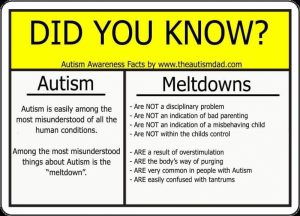I thought I would take a minute and share some of the things I have learned along the way as far as speaking to a child with Autism.
When speaking to an Autistic child you need to keep something in mind. Autistic children typically see the world in black and white and don’t see the grey areas at all. This can making communicating to an Autistic child difficult at times.
It’s very important to learn and understand how to talk to an Autistic child because doing so incorrectly can lead to anxiety, and subsequently meltdowns. Autistic children are typically very literal minded. This means they will most likely take what you say at face value. You should avoid words or phrases like maybe, sometimes, next time, not now or later on.
These words are open ended and can be subject to interpretation, which can, and will cause the child to experience needless anxiety. You will also likely have to contend with them asking “if it’s time now” (or something to that effect) over and over again until they get what they are waiting for. This can also lead to meltdowns as the anxiety builds.
To avoid this you should use black and white words or phrases like yes, no, always or never.
These are not open ended words and therefore are not subject to interpretation.
You may know that telling an Autistic child that he or she will never be able to play video games (just for example) is a gross exaggeration (and maybe it’s not) but they will not be wondering, worrying or getting anxious about when they can.
It may seem cruel or heartless to say something like that when you know it may not be the case long term, however, it’s not. It’s more of a necessary evil, if you will. What you are doing is saving that child from constantly worrying about when the next time he or she can play video games again (again, as an example). This will also help to avoid anxiety based behavioural issues like, meltdowns.
Something else to keep in mind is that you should never, ever, ever, ever promise a child with Autism something without fully intending to deliver on that promise. While this holds true for any child, it has a more devastating effect on children with Autism. In fact, I make it a practice to never say anything that I don’t know to be a certainty. In my experience, children on the Autism Spectrum, tend to generalize things. If you promise something and then fail to deliver, no matter how well intentioned you may be, the child can and will likely experience distress. They may also generalize the situation and simply start assuming that this will happen every time something is promised, and you don’t want that.
This is just one of the many challenges facing the special needs parent when it comes to raising an Autistic child. Keep these things in mind if you are going to speak to an Autistic child as you may not be there to experience the fallout from a poorly worded but well intentioned conversation.


I'm an asperger adult, and though I'm the last one to admit it to myself, and still have a difficult time coming to terms with it, my mind exhibits cognitive distortions constantly ( see, right there, that was an example of a distortion ).
Your writing today makes me realize that individuals who are not on the spectrum can integrate awareness of those distortions in others into their communication methodology; in other words, you are quite probably aware of these distortions and how to work with them, much more so that those who exhibit them.
Familiarizing yourself with other cognitive distortions, and forming direct and proactive counter measures to deal with them, as you have here, certainly seems like a great strategy. One thing I'm pretty sure of though… individuals on the spectrum are not likely to remove their 'distortions' entirely, so continue to avoid corrective direct techniques and their resultant ramifications ( meltdowns )
http://healthymind.com/s-distortions.html http://powerstates.com/10-cognitive-thinking-erro…
thanks for your time, and your writing.
Thank you so much for sharing that. You would not believe the amount of people offered this post and others like it.
Your insight is so important and I\’m so grateful that you chose to share it with me. Thank you so much. 🙂
Amen, Amen, Amen!